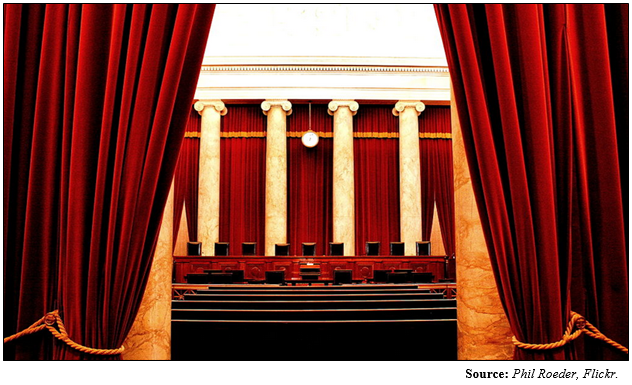“Our nation faces its greatest internal divide in more than 100 years, and the Supreme Court’s current composition reflects that division. Many of the issues that will define the next century are likely to be decided by whoever is the next member of the Supreme Court, and it is fitting that the American people should have a say in that process.”
That was Americans for Limited Government President Rick Manning outlining the high stakes involved in the appointment of the next Supreme Court Justice after the death of Justice Antonin Scalia.
Consider these just for starters.
At some point the Supreme Court may revisit the D.C. v. Heller Second Amendment decision that upheld the individual right to bear arms.
Or the Citizens United First Amendment decision that upheld the right to speak up during elections.
Or upcoming decisions on the National Security Agency surveillance programs gathering intelligence on every single American as the Fourth and Fifth Amendments hang in the balance.
These will not be easy decisions, and they could even be 5 to 4 decisions.
In the landmark ruling Marbury v. Madison in 1803, Chief Justice outlined the role of judicial review, “It is emphatically the province of the judicial department to say what the law is.”
He might have added, by a majority vote. Meaning, how the Constitution is interpreted over the next generation could very well be determined by how the balance of the court is constituted right now.
And with the Supreme Court so closely divided, that means the very definition of the Constitution is at stake.
That is how important this is.
As Senate Judiciary Chairman Chuck Grassley (R-Iowa) recently noted to reporters on Feb. 13, “It is a very important position because Senator Schumer talked about balance [in 2007] and we had balance: 4 conservatives, 4 liberals and 1 moderate, and maintaining that balance for the Supreme Court is just as important now as it was in 2007.”
Here, Grassley was referring to a July 2007 statement by Sen. Chuck Schumer (D-N.Y.) that then-President George W. Bush should not be allowed to appoint any more Supreme Court spots during the remainder of his term except during “extraordinary circumstances.”
In this case, an Obama appointment now would without question shift the balance of the court to liberal.
“If that is the will of the voters, let it be decided in November at the polls, not by a lame duck President,” Manning said, urging the Senate to slow down.
“The easy and cowardly path would be to rubber-stamp whoever the current lame duck President appoints. However, with fewer than eleven months remaining in his term and a hotly contested election in both parties, it does a grave disservice to the voters of the United States to consider a nominee from someone who will soon be a footnote in history,” Manning insisted.
So far, Senate Republican leaders are holding strong and promising no action on any Obama nomination.
“[Mitch McConnell and Chuck Grassley] have it exactly right,” Manning said.
“The whole point of the Republican Senate majority at this point in history, if any, is to stop Obama from fundamentally transforming America in his final year in office, and his Supreme Court nomination will unquestionably shift the balance of the court and the nation,” Manning concluded.
Meaning, this could very well be the Senate GOP majority’s defining moment. Will it step up, or back down?
Time will tell, but its impact on how the Constitution is interpreted by the next Supreme Court Justice could last for a generation or more.
Robert Romano is the senior editor of Americans for Limited Government.







